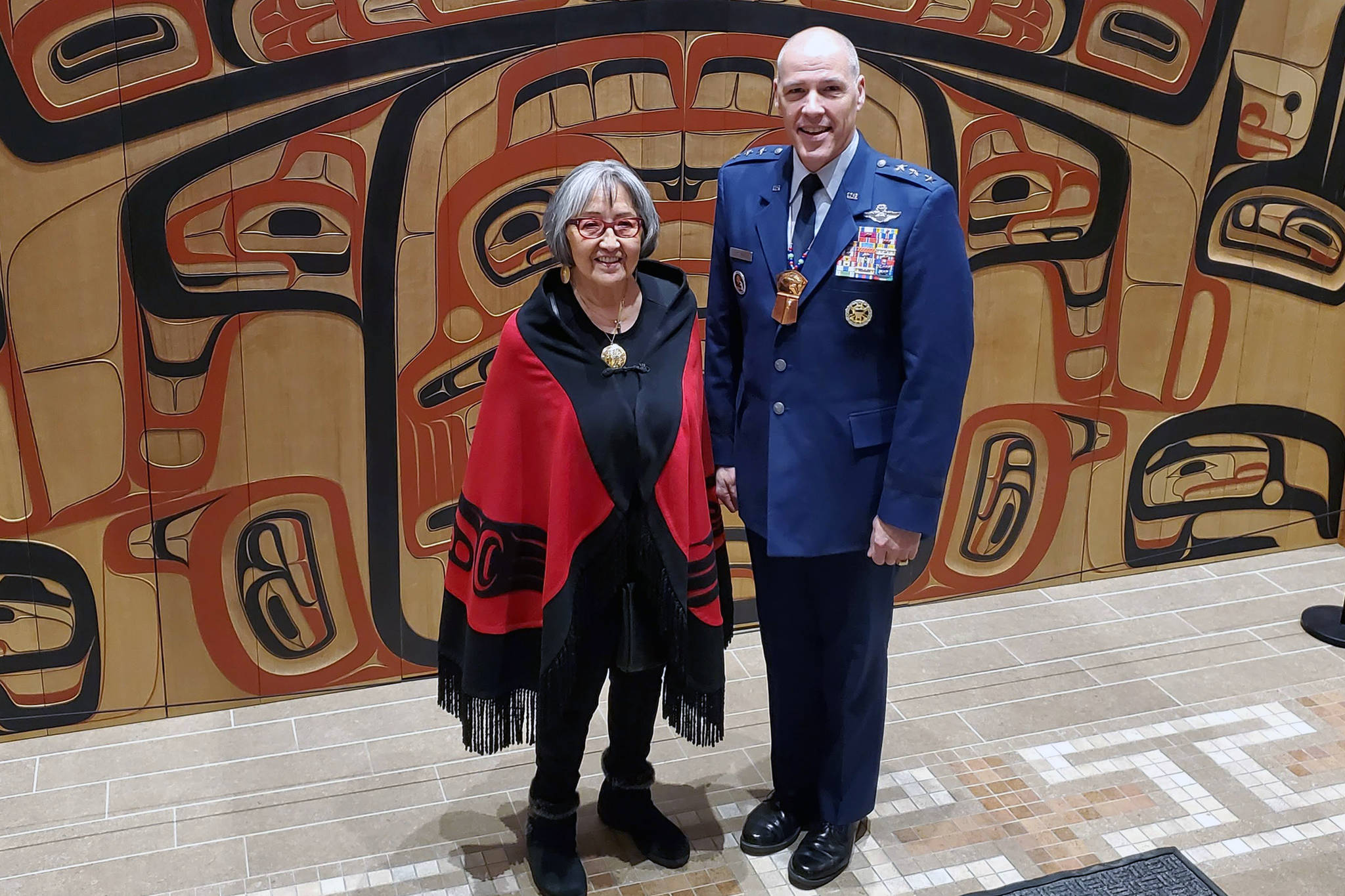Meetings in Juneau this week could lead to apologies more than 150 years in the making.
Air Force Lt. Gen. Tom Bussiere, Commander of Alaskan Command, and Alaska Native leaders, including tribal leaders and clan leaders from Kake, Wrangell and Angoon, met at Sealaska Heritage Institute’s Walter Soboleff Building Wednesday to discuss a trio of 19th-century conflicts in which the U.S. military bombarded Alaska Native villages.
“Today was the beginning of a great journey, I think, in addressing some institutional events and memories from the past,” Bussiere said in an interview.
SHI President Rosita Worl joined Bussiere for the interview. SHI is a Juneau-based nonprofit that protects and promotes Alaska Native art, language and culture.
The events referenced by Bussiere date back to the mid-1800s when the U.S. Army and later the Navy bombarded Alaska Native villages. Three village sites and two forts near present-day Kake were destroyed in 1869 when the sites were shelled by the U.S.S. Saginaw, Wrangell in 1869 was bombarded by the U.S. Army, and in 1882 Angoon was bombarded by the U.S. Navy.
“I know the Angoon people have really consistently been asking for their apology,” Worl said. “In their ceremonies they have, on the date of the event, they always say, ‘Is there anyone here from the Navy here to apologize? Is there anyone here from the Navy to apologize? Is there anyone here from the Navy to apologize?’ And there’s always silence.”
Representatives from the three Southeast villages met with Bussiere for three hour-long private meetings. The day also included a ceremonial welcoming and a tour of SHI’s “War & Peace” exhibit that details the bombardments.
[New exhibit lays bare war and peace in Southeast]
The sit-downs were more than a year in the making and began when Worl reached out to see if such a collaboration might be possible. Worl said she did not expect the outreach to be so fruitful.
“I really didn’t,” she said.
Worl said during the meetings, clan and village representatives were unified in wanting some sort of public redress for the military action against Native communities.
“It was an emotional experience for them,” Worl said. “but I think the main thing I saw is that they were very grateful this acknowledgment was happening, and they all saw it was a process, and that this was the beginning of a process that would lead to a reconciliation, an apology and/or a response. They wanted the apology. They wanted the apology to come from the military (branch) that was involved in the incident.”
Bussiere, who was given the Tlingit name Litseenikàa Li-tsee-ni-kàa in August 2019, said it’s “not a bridge too far” to have that dialogue, but did not have a timeline for when such an apology or acknowledgment might take place. He said it’s more important to get it right than to rush.
“I think the process and the timeline will be unique to the community,” he said.
While former Gov. Bill Walker formally apologized to Alaska Natives for the wrongs of colonization in October 2018, and Canada has apologized to its indigenous people for similar injustices, Worl and Bussiere both said they were unaware of a past example of a reconciliation between military branches and indigenous people in Alaska.
Worl said the United Nations’ Declaration on the Rights of Indigenous Peoples is among the things being considered to shape the process going forward. The declaration, which was adopted by the U.N.’s General Council in 2007, underscores indigenous peoples’ rights to maintain their institutions, cultures and traditions and sets a standard for eliminating human rights violations against indigenous peoples.
While no one who was in the Army in 1869 or the Navy in 1882 is still alive let alone part of the military, Bussiere said that doesn’t undercut the necessity for pursuing some sort of reconciliation.
“Why now? Why not?” Bussiere said. “From a personal perspective, and it’s not unique to this topic, and you can look at a lot of different topics and look at if not now when and if not us who? The relationship between the Alaska Native community and the Department of Defense is strong, and it has been strong for decades. I think just out of mutual respect and honoring of their traditions. I think it’s worth the efforts.”
• Contact reporter Ben Hohenstatt at (907)523-2243 or bhohenstatt@juneauempire.com. Follow him on Twitter at @BenHohenstatt.

